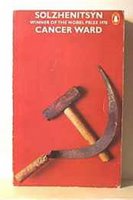 Hi y’all.
Hi y’all.I have been busy being depressed about my holidays ending.
Gotta face the fact that it’s over.
It’s over.
Back to reality here, I am thinking of doing a sort of a series of bloggatry on books that have greatly influenced my taste in great literature.
One of the first authors that comes to mind is Alexander Solzhenitsyn.
His novel, Cancer Ward, published [in English] in 1969.
I have written previously, of his novel The First Circle, and also, on Solzhenitsyn in general, but tonight, a few words about Cancer Ward…
"All I want is... to sleep on a camp-bed under the stars... to live just this one summer..."
That is the simple sentiment of the patients of the Cancer Ward... expressed by one, but felt by all. Through a study of the diverse lives of the characters here assembled, Solzhenitsyn probes with searing exactitude the process of living with cancer, and more specifically, the treatment of cancer in Stalinist Russia.
He had reason to be acquainted with firsthand knowledge of the topic. In 1954, the 35 year old Solzhenitsyn was himself diagnosed with a rare form of cancer known as seminoma, and was admitted for radiation treatment.
The importance of Cancer Ward lies in its ability for us as readers to consider that aspect of life which we all have in common... our mortality. Here we see all the possibilities of response: initial denial, hope, fear, loss of freedom, reluctance to accept treatment, despair, eventual resignation... we laugh and we cry with those who laugh and cry. These are REAL fictional people. In fact, the character of Oleg Kostoglotov is very similar to that of Solzhenitsyn himself. Kostoglotov is the optimistic realist, and one of the few who ever leave the cancer ward on their own two legs. The biographer D.M. Thomas has noted that Solzhenitsyn seemed to have defeated his cancer by his own "iron determination to live", as does Kostoglotov. Often in the novel, K is pitted against Rusinov, a high-ranking government official who has the most prolonged struggle with accepting his own diagnosis. One significant verbal exchange between the two is as follows:
Rusinov: "We musn't talk about death! We mustn't even remind anyone of it."
Kostoglotov: "If we can't talk about death here, where on earth can we?"
On September 22, 1967 a session of the Union of Soviet Writers was convened to discuss the degree of censorship to which Solzhenitsyn's Cancer Ward should be subjected... some came to revile and berate him, others were there to offer a sort of restrained praise. At that meeting, the author stated: "...I absolutely do not understand why Cancer Ward is being accused of being antihumanitarian. Quite the reverse is true: life conquers death, the past is conquered by the future... In general, the task of the writer cannot be reduced to defence or criticism of one or another form of government. The tasks of the writer are connected with more general and durable questions, such as the secrets of the human heart and conscience..."
After Solzhenitsyn had left to catch his train, it is reported that one of the committee members (Surkov) said: "Well, now we can relax over a few vodkas. I'll tell you what I really think. It may be that when the Soviet empire has gone the way of the Third Reich, Cancer Ward will come to stand even higher than First Circle among his novels. The latter is perhaps just a bit too enclosed, so to speak, within our political system, whereas the former, by dealing with something universal in human experience - cancer, pain, the certainty of dying - will never lose any of its relevance."
I could not agree more wholeheartedly.
Cancer Ward.
Definitely re-readable.
Indispensable, in the canon of who I am.
**********
2 comments:
Can't wait to see what you have to say about PEARL.
Jordan, have you read the book?
I will definitely write of it, here on bookpuddle when I am done the thing. [I am just starting it].
Post a Comment